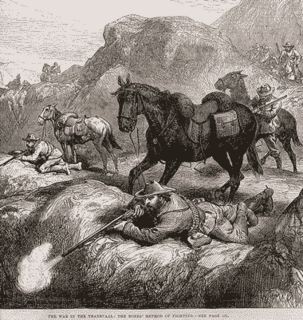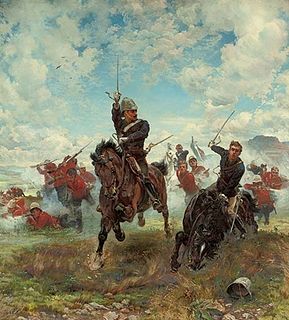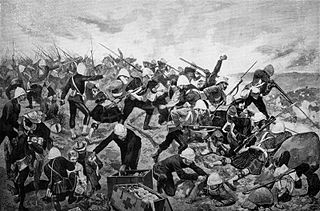 W
WThe First Boer War, 1880–1881, also known as the First Anglo-Boer War, the Transvaal War or the Transvaal Rebellion, was a war fought from 16 December 1880 until 23 March 1881 between the United Kingdom and Boers of the Transvaal. The war resulted in a Boer victory and eventual independence of the South African Republic.
 W
WThe Paardekraal Monument is situated in Krugersdorp, South Africa. The monument commemorates the original site of vow made by Transvaal Boers on 13 December 1880, prior to the armed rebellion known as First Boer War, when they vowed to regain their independence from the British Empire. This earlier monument was a cairn made of thousands of stones representing the gathered burgers' vow. This official monument enclosed the original stone cairn and was built in 1890 by the South African Republic (ZAR) to commemorate their independence from Great Britain.
 W
WFloreat Etona! is an 1882 painting by Elizabeth Thompson, Lady Butler. The title is the motto of Eton College, "may Eton flourish". The painting depicts an incident that took place in 1881, during the First Boer War.
 W
WThe Last Boer War is an 1899 non-fiction book by H. Rider Haggard about the Boer War of 1881. It was originally written in 1882 but not published until years later.
 W
WMajuba Day (Afrikaans: Majubadag) was a major annual national celebration on 27 February in the South African Republic in the period between the First and Second Boer Wars. The day was named after the Battle of Majuba Hill where on 27 February 1881 the main battle of the First Boer War took place.
 W
WThe Pretoria Convention was the peace treaty that ended the First Boer War between the Transvaal Boers and Great Britain. The treaty was signed in Pretoria on 3 August 1881, but was subject to ratification by the Volksraad within 3 months from the date of signature. The Volksraad first raised objections to a number of the clauses of the treaty, but did eventually ratify the version signed in Pretoria, after Britain refused any further concessions or changes to the treaty.
 W
WThe Ras Cannons were the first cannons built in South Africa. The two cannons were constructed during the First Boer War on a farm Bokfontein in Brits district.